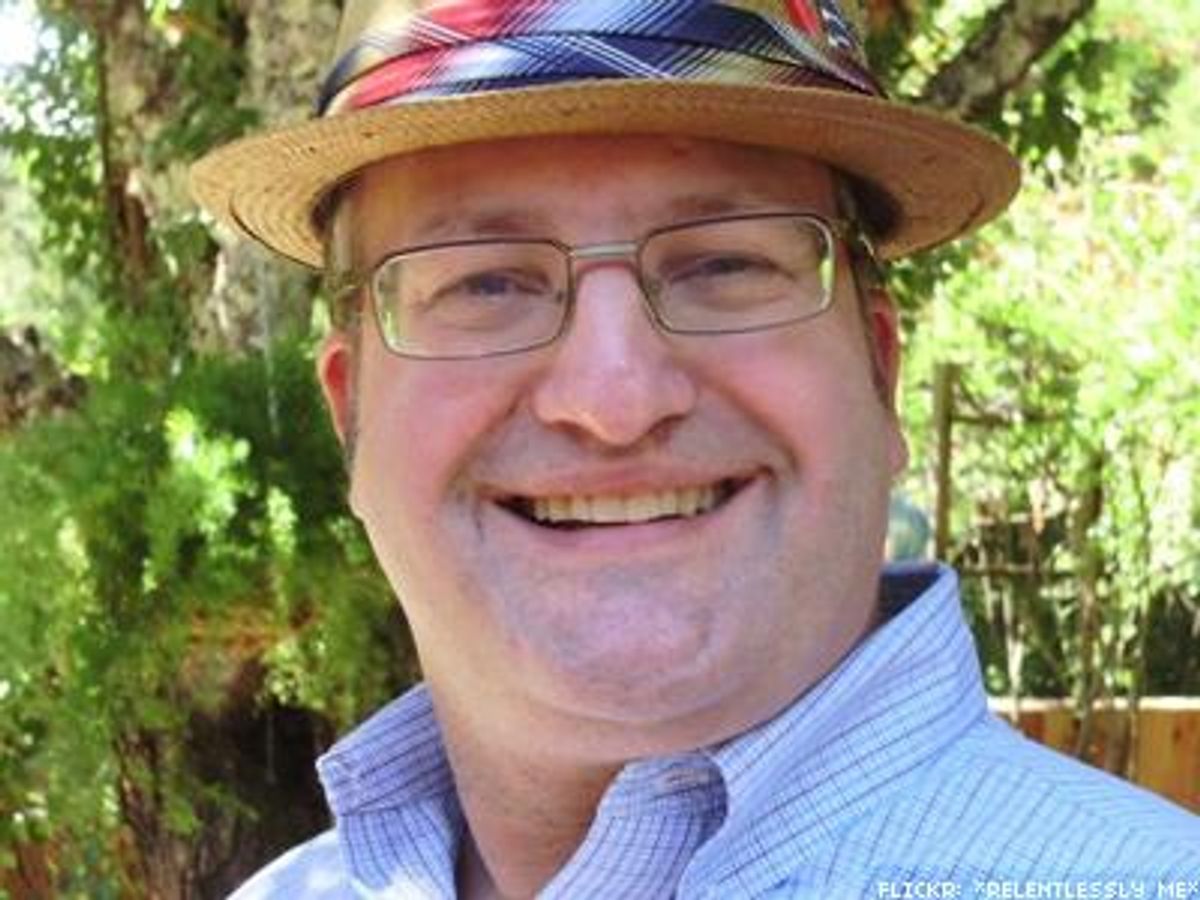Every morning, after the first few moments of blinking awake, I feel the weight of the same three questions: "Why?" "How could he?" and "Could I have done more?"
Bewilderment. Anger. Guilt. A toxic combination, united by overwhelming sadness.
Sometimes my wife, Debs, will detect my discomfort and ask gently, "Are you thinking about Tim?"
The truth is I am always thinking about my best friend of 21 years. Or more specifically why he -- such a brilliant, witty, warm, popular person -- committed suicide in February of last year.
I was a 24-year-old journalist when I met Tim Martin, then 27, on travels in the Caribbean in December 1990. I was sitting with my then-girlfriend on a deserted beach when he strolled toward us, tanned and brimming with confidence.
''Pleasant day," he said.
''Seen worse,'' I smiled. Tim was a ''business guy and artist'' on holiday from Chicago. With his infectious enthusiasm, he told us about the art and architecture of his hometown, the blues bars, the politics, the parks.
''Come and stay with me any time,'' he said.
I ended my trip with a detour to Tim's home. I'd begun to suspect my girlfriend was cheating on me (we were young and the relationship wasn't that serious). I decided to flee and remembered his invitation.
Looking back, it was an outlandish decision, but one that cemented one of the most important friendships of my life. Tim was the best host, taking me around the city, pointing out all the grand buildings. Later, we'd go out for a few beers. We shared a raffish sense of humor and could talk for hours. He was a strong person who naturally wanted to help other people. Very quickly he slipped into an older brother role.
I left after a week; it was to be my first and last trip to his home. (I had started to develop a profound fear of flying after an engine failed on a flight to the Caribbean.)
The following year Tim visited me in London and I took him to the Tate Gallery and to many a bar in Soho. From then on, he would fly out to see me at least once a year, sometimes every three or four months. In between we wrote long, excitable letters to each other and spent hours on the phone. These were replaced by emails, Facebook messages, and Skype calls. Ever spontaneous, Tim would contact me and say, "I've found some cheap flights ... see you tomorrow!" I'd meet him at the same coffee shop in Heathrow and away we'd go. There was many a riotous night out, including six New Year's Eves, the most memorable of which was the eve of 2003.
That's when I first introduced Tim to Debs, whom I'd met in a local pub in Kingston-upon-Thames. Tim had known many of my girlfriends, but Debs was the first he raved about; he knew me so well and quickly worked out she was "the one."
As is often the case among close friends with shared values and interests, our lives began to mirror each other -- though Tim was a self-assured American who happened to be gay, and I was none of the above.
He adopted a son, Andrew, who was then 10. I'll never forget his ebullience on the phone that day: "''I have a son! I have a son!''
A couple of years later Tim settled down with a long-term boyfriend, and in 2005 I went on to marry Debs. Then came our two beautiful sons, Daniel, now 4, and Darley, 2.
Both Tim and I decided to move to the country: He settled in Sonoma County, Calif., and we chose west Devon -- in each case, 20 miles from the sea.
Tim last visited in December 2006, not long before we left London. We took Tim and his nephew Kevin -- with whom he often traveled -- to Dorset, and we saw in the New Year with typical energy.
If I'd known our parting hug would be the last, I would never have let Tim go. I cling to the memory of his stubble scraping my cheek, his stocky arms squeezing me reassuringly tight, his familiar aftershave ...
I felt aghast when, after his death, I realized we hadn't seen each other for six years. I'd always thought it was only about two or three. But the fact was that time had marched on and life had got in the way. Not to mention my fear of flying and the fact that Tim's partner feared planes as well.
Thankfully, the thing about a soulmate like Tim is that friendship isn't diminished by absence. We were in weekly -- often daily -- contact, and he was planning to visit our rural idyll just before depression took hold.
There had never been any hint of the black dog before, although friends commented that, in his startling wit and incisiveness, Tim was an American version of Stephen Fry, who spoke of his own desire to kill himself earlier this year.
When Tim first started emailing dark thoughts, I didn't take it seriously; I just figured it would pass and he'd pull himself together. If I reveal the contents of these messages, you'll understand the clouds of guilt. You may even question my judgment -- as, God knows, I have.
It was 10 days before Christmas in 2011 when he sent me one chilling line: "I might just kill myself."
I replied: "Don't. Do you want to chat?"
I might have sounded flippant but that's how the two of us conversed, downplaying drama. His partner had left him for someone else, his son had recently flown the nest to start adult life, his business wasn't going too well. and he had diabetes with high blood pressure. At 48, I think, he felt washed up and lonely.
For two months we emailed and chatted on Skype. Tim's mood fluctuated wildly. One minute he was telling me he didn't "want to live anymore"; the next he seemed to be turning a corner, planning his next visit.
Whenever I discussed it with Debs, we agreed he would never do anything silly. This was Tim, after all, unassailable and worldly wise.
I sent him old photos to remind him of the good old days, messages from my two boys -- whom he was yet to meet. I told him I loved him many times.
A week before he died, Tim wrote,"Please remember I had a very full life with lots of amazing places, events and people. Of all of them you are the highlight." How I wish I'd told him he was one of my highlights too. Instead I thanked him and promised to Skype soon. Our last messages were exchanged days later, on February 23, 2012. I was asking to Skype and he replied. "It's midnight, I need to sleep." I replied. "Have sweet dreams" -- an eerily pertinent response.
Four days later I was browsing Facebook when I strayed on to Tim's page. I can't remember how I reacted, whether I went tense or started to crumble, but Debs was alerted to my shock. "'Oh, my God, he's done it,'' I said.
It felt as if the blood had drained from me. Debs took hold of me and we just stared in silence at the screen. On Tim's profile, his son and his ex had posted messages about having '"loved'' him and that they would always miss him. I emailed Tim's nephew Kevin and he confirmed my fears -- Tim had hanged himself in the early hours of the morning.
At first I just felt numbness -- nothing. Then came disbelief: checking Facebook to see if I'd imagined it. Soon after there was incredulity mixed with frustration: "But it's nearly spring, then there'll be summer ... why did he want to miss out on all that?''
The darker emotions were to follow. The anger at what many people told me was a '"selfish act'' (I have since accepted that while the act itself might be selfish, Tim the man was not), the agonizing guilt. I should have got on a plane to see him in his hour of need. He would have done that for me.
It goes without saying there were copious tears. After a few days, on the advice of a wise, older friend, I wrote a three-page letter to Tim, an outpouring of these complex emotions. I walked up the muddy lane by our house to the sublime views of Dartmoor on one side and Bodmin Moor on the other.
There, I read the letter aloud, my voice shaking, my eyes stinging and my heart thudding. When I finished, I set it alight, dropped it on the ground, and watched it blacken as the fire took hold, eating the words and the feelings in those words.
As I watched the smoke drift up into the clouds, I wondered if Tim could somehow see or sense me. It was a form of release.
Last June, I found myself starting a book about our friendship. It too was a cathartic process, which I hope might help others in a similar predicament. I called it Relentlessly Me, which is something Tim tweeted about always being and that summed up perfectly how he lived his life. I now realize we should all strive for that -- to be relentlessly ourselves.
A loss like this colors your whole life. I am so very grateful for my patient wife. I've usually been a calm person, but the other day she admitted I had changed since Tim's death. When I pressed her, she said I was quicker to react to situations, that I didn't tolerate nonsense or poor behavior by someone as much as I previously had. This is perhaps understandable: at times I ache so much I feel as if I'll implode.
Yet life must go on: I have a busy job as a writer and need to stay strong for my family.
Of course, the boys are far too young to understand, but the other day Daniel caught me looking at a photo of Tim and asked, "Who's that?" It triggered our first ever chat about life and death. His brow crinkled as I told him Tim was now "asleep in the clouds."
There is some solace. I have made contact with Tim's friends and relatives, including his mother and his son, people I'd never met whom I now consider friends. I've been able to be there for his son. Then there's the strange life-affirming nature of loss, which both delights and feels jagged. It goes something like this: I'm so lucky to be alive, to delight in these wondrous rolling hills, all the amazing people around ... If only Tim were here to see it with me.
And of course there's the fact you naturally hug your wife and children that bit tighter, appreciate them even more, if that's possible.
Of course, there is no positive aspect to suicide. But Tim was a joyous person, full of life, love, and laughter, and he'd hate for me to suggest otherwise or indeed to be otherwise. It's about celebrating the things we shared. I have such wonderful memories: How I wish with all my heart we could just make some more of them.
DAVID HURST lives in Devon, England. Relentlessly Me is available as an ebook from Amazon.com or Amazon.co.uk For more on Relentlessly Me, follow @dontbutterfly.


















































































